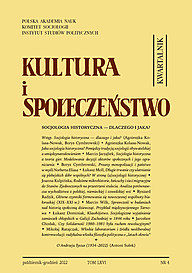Fenomen pisania o własnym życiu
Konkursy pamiętnikarskie w Polsce w XX wieku
The phenomenon of writing about one’s own life. Diary of competitions in Poland in the 20TH century.
Author(s): Paweł RodakSubject(s): Polish Literature, Social Theory
Published by: Instytut Studiów Politycznych PAN
Keywords: memoire; diary; diary competitions; biographical method; document; literature;
Summary/Abstract: The article contains a brief description of the Polish tradition of diary competitions and the usage of autobiographical documents in the Polish social sciences. This tradition harks back to the 1920s, and is linked to the activities of Florian Znaniecki, who collaborated with William Thomas on the compilation of the monograph The Polish Peasant in Europe and America based on personal documents, chiefly letters and autobiographies. Between 1918 and 1939 the tradition was nurtured by the Instytut Gospodarstwa Społecznego [Institute of Social Economy] under the guidance of Ludwik Krzywicki. The ISE organised a few important diary competitions (for peasants’ diaries, diaries of the unemployed, and the diaries of emigrants). The research methodology, known as the biographic method and associated with the names of Florian Znaniecki, Józef Chałasiński and Jan Szczepański, was also developed then. During the War, the tradition was continued through the practice of collecting wartime and Holocaust testimonies (e.g. the activities of the Oyneg Shabbos group in the Warsaw ghetto, bearing fruit in the creation of the enormous Ringelblum Archive). Then, after World War II, the Towarzystwo Pamiętnikarstwa Polskiego [Polish Diary Association] was founded; it organised numerous new diary competitions and coordinated the activities of the Polish diary movement. Towards the end of its activities the TPP archive was in possession of almost 900,000 diary manuscripts and typescripts; sadly, after the year 1989, as the TPP’s funds for its activities steadily dwindled, the vast majority of them were lost. That is why the existence of social archives, in which diary and autobiographical materials can be stored, is so important. The latest face of diary competitions is described in brief at the end of the article: competitions organised at the turn of the 21st century for the diaries of peasants and the unemployed, as well as competitions for diaries from the pandemic of 2020 and 2021.
Journal: Kultura i Społeczeństwo
- Issue Year: 66/2022
- Issue No: 2
- Page Range: 9-38
- Page Count: 30
- Language: Polish

